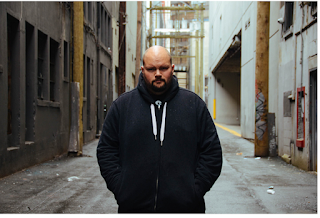I met Sam Wiebe at Bouchercon in Raleigh through mutual friends. We shared a table at that year’s Shamus dinner, where I learned he’s as good a guy as he is a writer. Sam is the award-winning author of the Wakeland novels, one of the most authentic and acclaimed detective series in Canada, including Invisible Dead, Cut You Down, and the new one, Hell and Gone. Sam’s other books include Never Going Back, Last of the Independents, and the Vancouver Noir anthology, which he edited. He has won the Crime Writers of Canada award and the Kobo Emerging Writers prize, and been shortlisted for the Edgar, Hammett, Shamus, and City of Vancouver book prizes. His original film/tv projects have been optioned, and his short stories have appeared in ThugLit, Spinetingler, and subTerrain, as well as anthologies by Houghton-Mifflin and Image Comics. You can follow him on Twitter (@sam_wiebe) and learn more about him on his web site.
One Bite at a Time: Welcome back, Sam. It’s always a
treat to have you. Give us the quick and dirty on your new book, Hell and
Gone.
Sam Wiebe: Thanks so much, Dana. Here’s the pitch:
An act of
public violence breaks out on the street in the early morning. Wakeland witnesses
the violence from his office, getting a look at the shooters as they drive off.
He leaps into action—literally jumping down from the fire escape to perform
first aid on the wounded. A hero.
But when he
enters the building where the shooters came from, he sees something so beyond
his experience that when the police ask him what he witnessed, Wakeland refuses
to say.
Soon
Wakeland is caught between a ruthless police chief and a pair of gang leaders,
all of whom want the shooters found, no matter the cost in human life.
The only
way for Wakeland to come to grips with this is to find the shooters—before they
find him.
OBAAT: Correct me if I’m wrong, but a common thread
through the Wakeland books is that, for all its multiculturalism, Vancouver is
very much an exclusive society. Am I right to pick up on that, or am I reading
things onto the books that aren’t there?
SW: Vancouver
is a far more troublesome place than the postcards lead one to believe. Harm
reduction, gentrification, gang warfare and systemic racism—these are at the
forefront of Hell and Gone. As
Wakeland says, “We are where the West ends.”
OBAAT: Wakeland’s partner, Jeff Chen, straddles a
line between his Chinese ancestry and the white Vancouver executive class.
Where did the idea for Jeff come from?
SW: I didn’t want Wakeland to have a sidekick—my
feeling is, if you’ve got a seven-foot sociopath with bad tattoos and a
stockpile of weapons on speed-dial, you’re probably don’t have to do much
detective work.
But I did want someone who contrasts and compliments Dave, a
partner with a different understanding of the city.
Jeff Chen is a family man, a businessman, the opposite of
Wakeland in a lot of ways. Their differences make their partnership all the
stronger. If Dave is Steve Wozniak, Jeff would be Steve Jobs.
But Jeff has a secret: the financing for their business came
from community leader and suspected gangster Roy Long. When Wakeland finds this
out, it will stress their partnership to its breaking point.
OBAAT: The past couple of books has taken Wakeland south of the border for insights on some particularly bad shit. Is this a metaphor for the US’s pervasive influence on Canadian business and society, or just that the plot logically took you to Baja Canada?
SW: I love America (I’m trying not to sound like the
beginning of The Godfather…). My
heart lies with the American style of detective novel, the focus on people
rather than puzzles. That’s the tradition I write in.
I’ve spent a lot of time in Washington State and Oregon, and
I’d just done a road trip to Raleigh when I started Hell and Gone. Culture doesn’t stop at the border, and neither does
Wakeland.
OBAAT: Your debut novel, Last of the Independents,
yet you abandoned PI Michael Drayton for Dave Wakeland, a partner in a large
agency. Why the change in course?
SW:
Several reasons, having to do with how Last of the Independents ends, the darker subject matter I wanted
to cover needing a different tone, and the nature of publishing. Making
Wakeland part of a successful detective agency was a way to open up to
different stories.
I look at Last of the
Independents as my ‘demo tape.’ But Hell
and Gone is the best detective novel I’ve written.
OBAAT: You and I are both great fans of David Milch. (Deadwood,
NYPD Blue, etc.) What is it about his work that resonates so strongly with
you? (In case you aren’t yet aware, his memoir, Life’s Work, drops in
September.)
SW: He deserves much better praise than I can muster
on a Tuesday morning, but here goes.
Before I’d really committed myself to writing, I found
myself in a college class next to a guy who’d just sold a screenplay. He told
me about Milch’s “Idea of the Writer” lectures, which you can find online. As
someone who never had a writing mentor—had never really met a novelist until I
was in my twenties—those lectures were very helpful to me.
OBAAT: If you could look back and give aspiring
novelist Sam Wiebe one piece of advice, what would it be?
SW: Learn as
much about how the business works as possible, so that its ups and downs
disrupt your writing as little as possible. It’s easier to “make a living as a
writer” if you’re smart with money and averse to debt.
OBAAT: And now for the traditional final question:
what’s next?
SW: Hell and
Gone is out March 8th, and I’m thrilled with the response so far. I’ve got
a standalone thriller on submission, and I’m revising Wakeland 4 right now.
Thanks, Dana!



